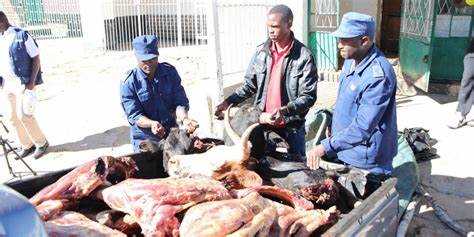
Zim Now Writer
A programme dubbed Operation Nyama Yabvepi involving the department of Veterinary Services, Police and the Ministry of Health and Child Care has intensified, leading to the closure of 86 butcheries out of the 256 inspected.
The operation, which was launched last Wednesday and runs until the end of January is aimed at ensuring butcheries do not sell uninspected meat and abattoirs do not accept sick animals for slaughter.
The campaign is also aimed at curbing stock theft which is driven by the ready market for meat that is provided by restaurants.
So far, over 2,3 tonnes of meat worth US$6 900 have been confiscated and destroyed, while 41 cattle and 17 goats worth US$21 180 have been recovered across the country.
On the other hand, 22 people have been arrested over cattle-related crime and nine more over other livestock.
Acting Deputy Director of Veterinary Field Services Dr Reverend Spargo said it is a criminal offence for any meat outlet to sell or display for sale meat that has not been processed in a registered slaughterhouse, and inspected and certified as fit for human consumption.
Related Stories
“Reports of unscrupulous abattoir operators, butcheries, supermarkets and meat vendors selling uninspected meat have been noted with great concern.
“This vice is more prevalent during the festive season hence the timing of the multi-disciplinary operation. The operation is also aimed at curbing stock theft which are driven by these unregistered meat outlets,” he said.
The Department of Veterinary Services has the mandate to ensure safe and wholesome food of animal origin through the inspection of livestock at farms or dip tanks of origin with permits only issued for the movement of healthy animals.
Head of Police anti-stock theft unit Assistant Commissioner Ezekiel Munengerwa urged people to cooperate towards eradicating stock theft.
“There has been a decline in cases of stock theft countrywide. However, the figures are still worrisome as the farming community continues to lose their livestock to criminals,” he said.
Besides the inspection of live animals, the Vet Department also does inspection of meat and milk and monitoring antibiotic, hormone and chemical residues at all stages of production and up to final consumption.




















Leave Comments